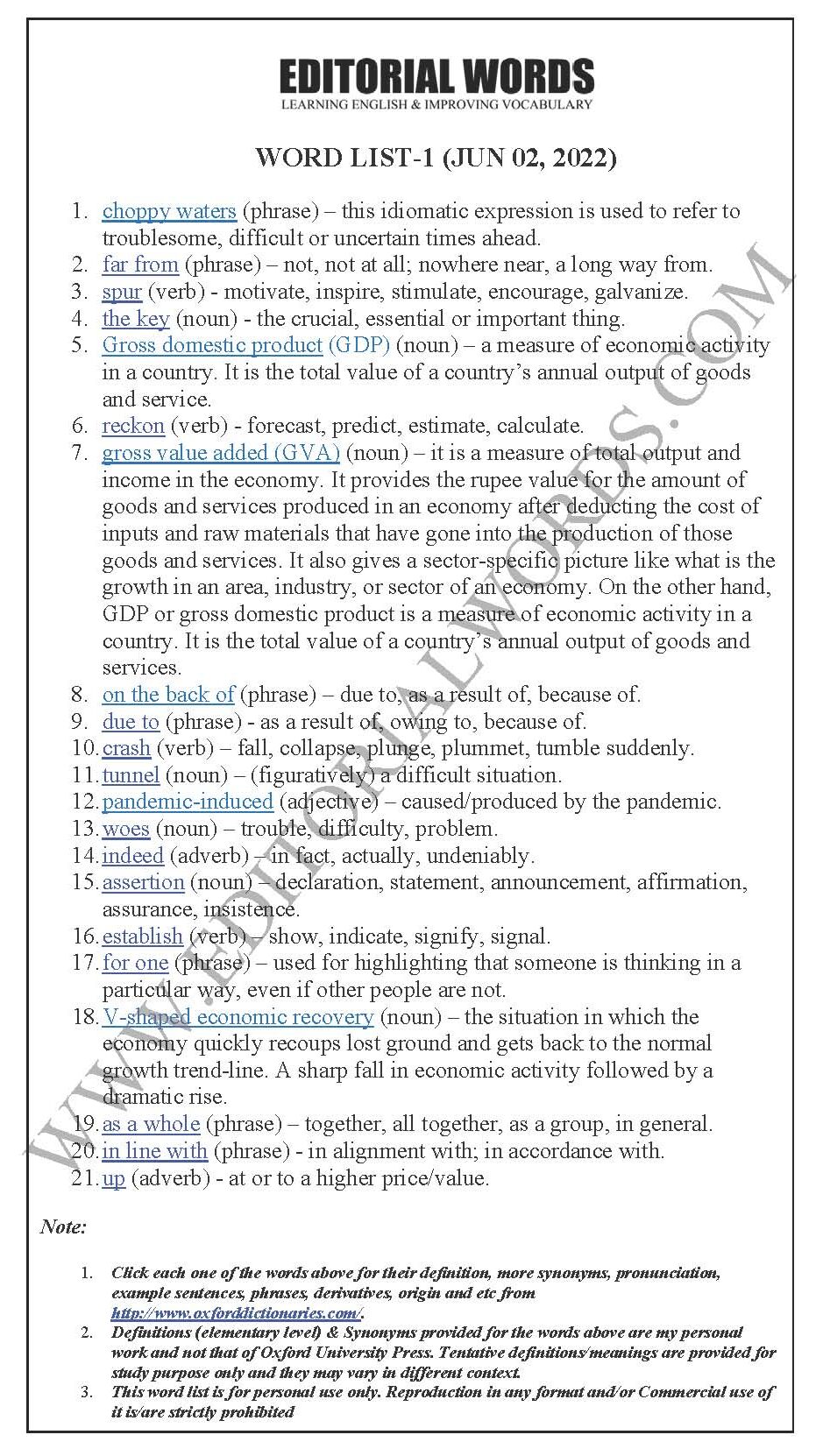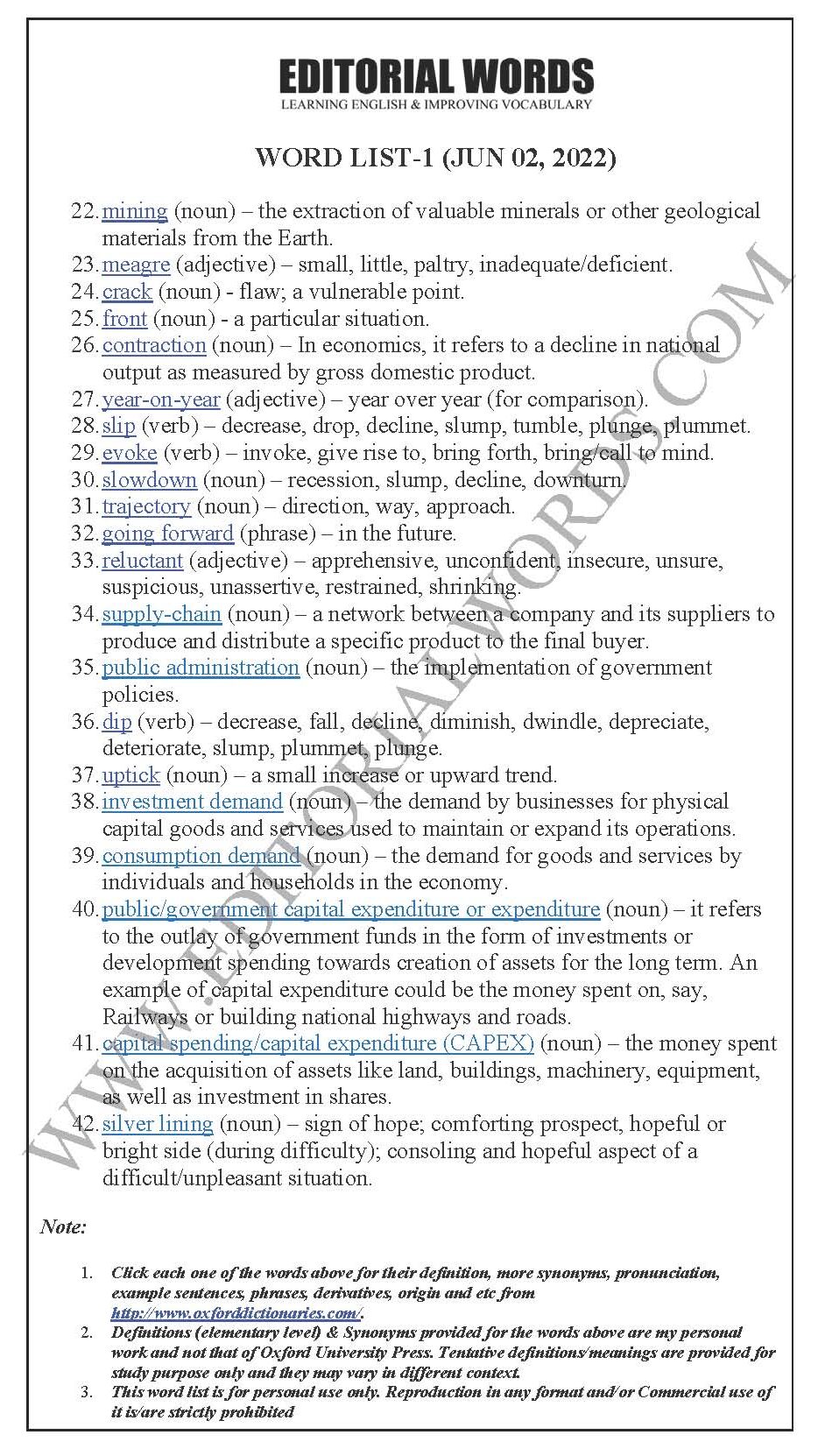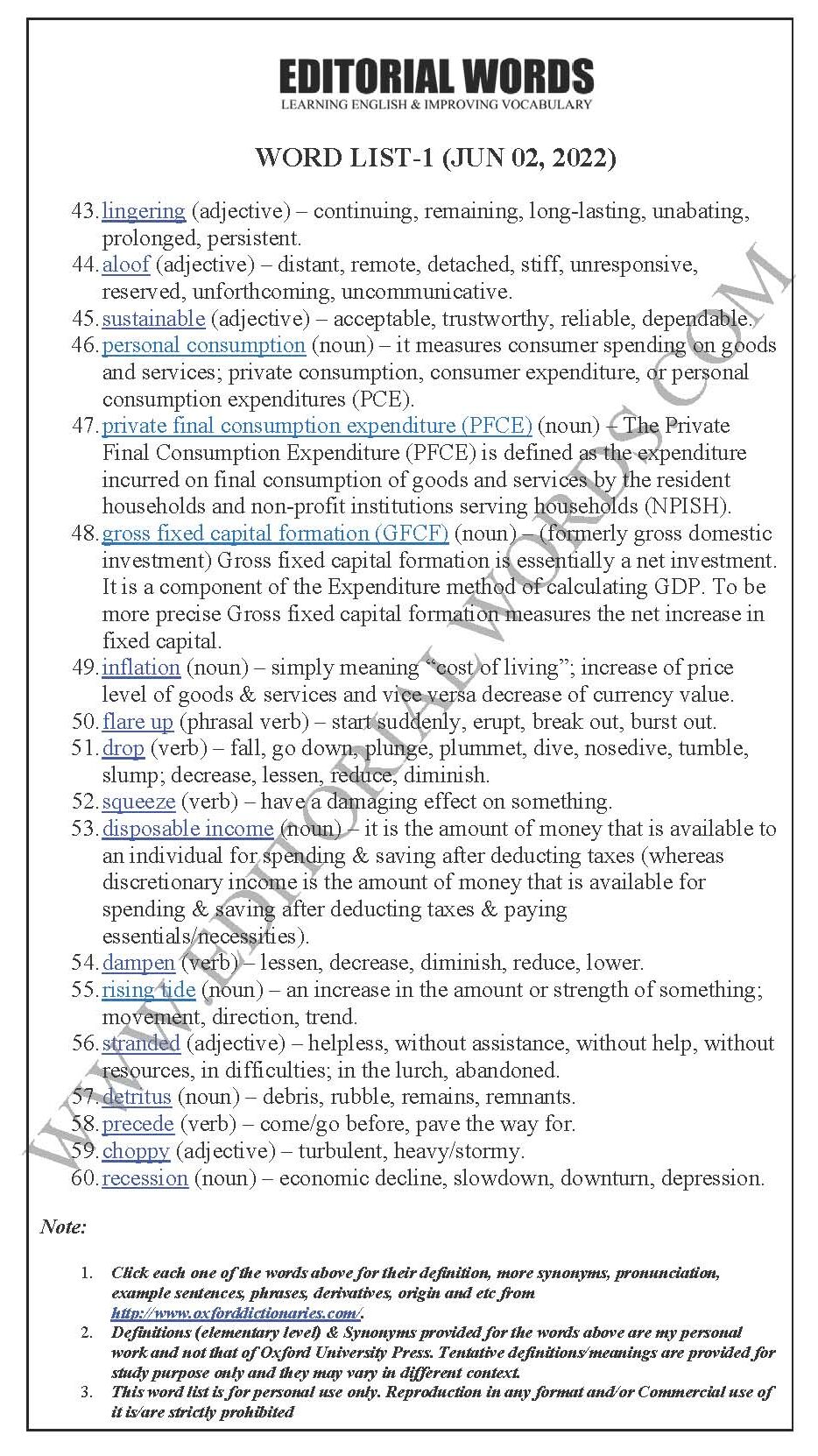The Hindu Editorial (Choppy waters) – Jun 02, 2022
India’s gross domestic product (GDP) is reckoned to have grown 8.7% while the Gross Value Added (GVA) rose 8.1% in 2021-22, as per national income estimates released on Tuesday. For further reading, visit “The Hindu”. Below is today’s word list-1 for The Hindu Editorial (Choppy waters) – Jun 02, 2022.
To read this article, click “The Hindu”.
This preview is provided here with permission.
Courtesy: The Hindu
The Hindu Editorial (Choppy waters) – Jun 02, 2022:
- choppy waters (phrase) – this idiomatic expression is used to refer to troublesome, difficult or uncertain times ahead.
- far from (phrase) – not, not at all; nowhere near, a long way from.
- spur (verb) – motivate, inspire, stimulate, encourage, galvanize.
- the key (noun) – the crucial, essential or important thing.
- Gross domestic product (GDP) (noun) – a measure of economic activity in a country. It is the total value of a country’s annual output of goods and service.
- reckon (verb) – forecast, predict, estimate, calculate.
- gross value added (GVA) (noun) – it is a measure of total output and income in the economy. It provides the rupee value for the amount of goods and services produced in an economy after deducting the cost of inputs and raw materials that have gone into the production of those goods and services. It also gives a sector-specific picture like what is the growth in an area, industry, or sector of an economy. On the other hand, GDP or gross domestic product is a measure of economic activity in a country. It is the total value of a country’s annual output of goods and services.
- on the back of (phrase) – due to, as a result of, because of.
- due to (phrase) – as a result of, owing to, because of.
- lockdown (noun) – an emergency protocol implemented by the authorities that prevents people from leaving from a place; An extended state of confinement/encirclement/isolation of a person by the authority.
- crash (verb) – fall, collapse, plunge, plummet, tumble suddenly.
- tunnel (noun) – (figuratively) a difficult situation.
- pandemic-induced (adjective) – caused/produced by the pandemic.
- woes (noun) – trouble, difficulty, problem.
- indeed (adverb) – in fact, actually, undeniably.
- pre-pandemic (noun) – before the pandemic.
- assertion (noun) – declaration, statement, announcement, affirmation, assurance, insistence.
- establish (verb) – show, indicate, signify, signal.
- for one (phrase) – used for highlighting that someone is thinking in a particular way, even if other people are not.
- V-shaped economic recovery (noun) – the situation in which the economy quickly recoups lost ground and gets back to the normal growth trend-line. A sharp fall in economic activity followed by a dramatic rise.
- as a whole (phrase) – together, all together, as a group, in general.
- in line with (phrase) – in alignment with; in accordance with.
- up (adverb) – at or to a higher price/value.
- mining (noun) – the extraction of valuable minerals or other geological materials from the Earth.
- meagre (adjective) – small, little, paltry, inadequate/deficient.
- crack (noun) – flaw; a vulnerable point.
- front (noun) – a particular situation.
- contraction (noun) – In economics, it refers to a decline in national output as measured by gross domestic product.
- year-on-year (adjective) – year over year (for comparison).
- slip (verb) – decrease, drop, decline, slump, tumble, plunge, plummet.
- evoke (verb) – invoke, give rise to, bring forth, bring/call to mind.
- slowdown (noun) – recession, slump, decline, downturn.
- trajectory (noun) – direction, way, approach.
- going forward (phrase) – in the future.
- reluctant (adjective) – apprehensive, unconfident, insecure, unsure, suspicious, unassertive, restrained, shrinking.
- supply-chain (noun) – a network between a company and its suppliers to produce and distribute a specific product to the final buyer.
- public administration (noun) – the implementation of government policies.
- dip (verb) – decrease, fall, decline, diminish, dwindle, depreciate, deteriorate, slump, plummet, plunge.
- amid (preposition) – in the middle of, surrounded by; during.
- uptick (noun) – a small increase or upward trend.
- investment demand (noun) – the demand by businesses for physical capital goods and services used to maintain or expand its operations.
- consumption demand (noun) – the demand for goods and services by individuals and households in the economy.
- public/government capital expenditure or expenditure (noun) – it refers to the outlay of government funds in the form of investments or development spending towards creation of assets for the long term. An example of capital expenditure could be the money spent on, say, Railways or building national highways and roads.
- capital spending/capital expenditure (CAPEX) (noun) – the money spent on the acquisition of assets like land, buildings, machinery, equipment, as well as investment in shares.
- silver lining (noun) – sign of hope; comforting prospect, hopeful or bright side (during difficulty); consoling and hopeful aspect of a difficult/unpleasant situation.
- lingering (adjective) – continuing, remaining, long-lasting, unabating, prolonged, persistent.
- aloof (adjective) – distant, remote, detached, stiff, unresponsive, reserved, unforthcoming, uncommunicative.
- sustainable (adjective) – acceptable, trustworthy, reliable, dependable.
- personal consumption (noun) – it measures consumer spending on goods and services; private consumption, consumer expenditure, or personal consumption expenditures (PCE).
- private final consumption expenditure (PFCE) (noun) – The Private Final Consumption Expenditure (PFCE) is defined as the expenditure incurred on final consumption of goods and services by the resident households and non-profit institutions serving households (NPISH).
- gross fixed capital formation (GFCF) (noun) – (formerly gross domestic investment) Gross fixed capital formation is essentially a net investment. It is a component of the Expenditure method of calculating GDP. To be more precise Gross fixed capital formation measures the net increase in fixed capital.
- inflation (noun) – simply meaning “cost of living”; increase of price level of goods & services and vice versa decrease of currency value.
- flare up (phrasal verb) – start suddenly, erupt, break out, burst out.
- household (noun) – family, house.
- drop (verb) – fall, go down, plunge, plummet, dive, nosedive, tumble, slump; decrease, lessen, reduce, diminish.
- squeeze (verb) – have a damaging effect on something.
- disposable income (noun) – it is the amount of money that is available to an individual for spending & saving after deducting taxes (whereas discretionary income is the amount of money that is available for spending & saving after deducting taxes & paying essentials/necessities).
- dampen (verb) – lessen, decrease, diminish, reduce, lower.
- rising tide (noun) – an increase in the amount or strength of something; movement, direction, trend.
- stranded (adjective) – helpless, without assistance, without help, without resources, in difficulties; in the lurch, abandoned.
- detritus (noun) – debris, rubble, remains, remnants.
- precede (verb) – come/go before, pave the way for.
- choppy (adjective) – turbulent, heavy/stormy.
- recession (noun) – economic decline, slowdown, downturn, depression, slump.
Note:
1. Click each one of the words above for their definition, more synonyms, pronunciation, example sentences, phrases, derivatives, origin and etc from http://www.oxforddictionaries.com/.
2. Definitions (elementary level) & Synonyms provided for the words above are my personal work and not that of Oxford University Press. Tentative definitions/meanings are provided for study purpose only and they may vary in a different context.
3. This word list is for personal use only. Reproduction in any format and/or Commercial use of it is/are strictly prohibited.
The Hindu Editorial (Choppy waters) – Jun 02, 2022:



“Phrasal Verbs” We Learnt Last Week
“Idioms & Phrases” We Learnt Last Week
“Important Definitions” We Learnt Last Week
Recent Word Lists For The Hindu Editorial Articles

Be the first to comment